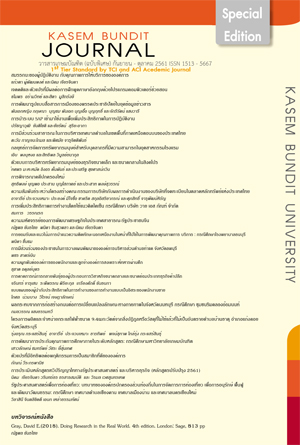Strategic Human Resource Management for Talented Employees in Hotel Industry
Keywords:
Human resource management strategy, talented employees, hotel industryAbstract
A qualitative research aimed to study strategic human resource management for talented employees in hotel industry. The researcher interviewed managers at various human resource management levels in hotels, and found that the leaders in all standard hotels were equipped with talent management policy, many supporting activities, system for developing and retaining human capital for the next-generation leaders, strategies to develop human resources for the key positions in order to advance their career path, application of oversea corporate culture’s best practice, systematic identification of key positions, strategic human resource development for important positions, the development of the differentiated human resource architecture, and the external labor market recruitment.
References
Becker, Brian E., Mark A. Huselid and Dave Ulrich. (2001). The HR Scorecard Linking People, Strategy, and Performance, Printed in the United States of America.
----------. (2001) The HR Scorecard Linking People, Strategy, and Performance. Harvard Business School press Boston, Massachusetts.
Bjorkman Ingmar, Mats Ehrnrooth, Kristiina Makela, Adam Smale, and Jennie Sumelius. (2013). “Talent or Not? Employee Reactions to Talent Identification”. Human Resource Management. Vol.52(2): 195-214.
Boonwises, Supot (2552)., “Talent Management in the next Decade.”, Journal of politics, administration and law., Vol 4 No 2 (2012)., Faculty of Political Science and Law., Burapha University.
Chatchasorn Kanjanasilanon.(2009). Human Resource Development Guidelines for Three Star-Rated Hotels in Bangkok, Thailand. The 4th International HR Conference 2011, Conference Theme “Managing People for Sustainability” To Commemorate His Majesty King Bhumibol Adulyadej’s 84th Birthday Anniversary, 18-20 Jan. 2012, Department of Service Industry, Faculty of Liberal Arts, Sripatum University, Bangkok.
Collings, D.G. and Mellahi, K. (2009). “Strategic Talent Management: A review and research agenda”, Human Resource Management Review, 19: 4, 304–313.
Jaeyoung Sung & Peter L. Swan. (2009). Executive Pay, Talent and Firm Size. University of Illinois at Chicago and Ajou University, Korea & Australian School of Business, University of New South Wales.
Khilji, S. E., Tarique, I., Schuler, R. S., & Gallo, P. (2015). “Incorporating a macro view in global talent management”. Human Resource Management Review, 25(3), 236–248.
Khilji, Shaista E., Ibraiz Tariqueb, Randall S. Schuler (2015). Incorporating the macro view in global talent management. The George Washington University, USA. Pace University, USA. School of Management and Labor Relations, Rutgers University, USA. Lancaster University of Management School, UK.
Minor International Public Company.(2557). 2014 Sustainability Report. Plan Grafik Co., Ltd., Bangkok.
Nathapan Kajohnnan.(2006) Human Resource Management.,Se-Education, Bangkok.
Nutavoot Pongsiri. (2012). “Roadmap to Bank of Thailand’s Strategic Human Resources Management for AEC.”, Journal of HR Intelligence, Vol 7 No 1 (2012): ( January - June 2012), Thammasat University, Bangkok.
Scott Bernadette & Sheetal Revis. (2008) Talent management in hospitality: graduate career success and strategies, Division of Cultural Business, Caledonian Business School, Glasgow Caledonian University, UK.
Downloads
Published
How to Cite
Issue
Section
License
ทัศนคติ ความคิดเห็นใด ๆ ที่ปรากฏในวารสารเกษมบัณฑิตฉบับนี้เป็นของผู้เขียน โดยเฉพาะ มหาวิทยาลัยเกษมบัณฑิตและบรรณาธิการ ไม่จำเป็นต้องมีความเห็นพ้องด้วย







